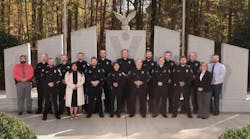Last month in an article entitled The Power of Belief--YOU Can Create High Performers we looked at how your beliefs and expectations--as a law enforcement leader or trainer-- can predestine recruit and officer performance. This month we take up the challenge of how to put your beliefs and expectations into action to create high performing officers.
Call Your Recruits and Officers to BIG, HEROIC Challenges
Some years ago, Time magazine wrote about the problem our "all volunteer" military was having filling their enlistment quotas with recruits that met minimum standards. Can any of you relate?
The military pointed to the economy--blaming low unemployment and a private sector that offered flex-time, profit sharing, better benefits, career changes and advancement. They considered a two-prong approach. First, they tried to compete with the private sector by touting sign up bonuses, paid college tuition, and career training that could later be parlayed into big bucks in the private sector (presumably when the soldier declined to re-enlist). And, they looked at their standards. Can any of you relate?
Faced with this dilemma, what did the Marines do? They raised their standards. Let's get this straight. The Marines said, "We don't pay any more than those other branches. We don't offer any more educational or other benefits. In fact, we're harder to get into and harder to stay in. But join us, because we expect and demand more of you." Yeah, right. So which branch of the armed forces has consistently met or exceeded its recruitment goals with soldiers who meet higher standards? The Marines.
What's the lesson here for law enforcement leaders and trainers? Whenever you have a goal you want to enlist recruits or officers to work towards, frame it as the biggest, toughest, seemingly impossible goal possible. People are drawn to grand, heroic adventures more than small tasks. That's the problem with "dumbing down." Asking small things of people, makes them feel small.
George Orwell said it,
The high sentiments always win in the end, the leaders who offer blood, toil, tears, and sweat always get more out of their followers than those who offer safety and a good time. When it comes to the pinch, human beings are heroic.
The best leaders understand that calling people to big, tough challenges signals a belief in their heroic potential. This belief by their leader enlarges the spirit and strength of people. Calling people to noble endeavors does something else. It creates meaning in the work being done. People want deeper meaning in their lives.
What's that some of you Baby Boomers (41 to 60 years of age) and Veterans (61 years and older) say? Gen X and Gen Y don't want anything tough? You can try telling that to the Marines, but they're not buying it. One of their recent commercials shows Marines in the mud, in the cold, sleep deprived, straining, grimacing. In exchange the Corps offers simply, "Duty," "Honor," "Country." The Army isn't buying it. One of its recruitment ads after September 11th showed Army soldiers throughout history answering the call to protect and serve at great hardship to themselves. The ad ended with "Every generation has its heroes. This one is no different."
And I'm not buying it. I train recruits and officers all over the country--including men and women in their 20s and 30s. I tell them that Teddy Roosevelt, who was once the top cop of New York City, described well the path they've chosen,
The credit belongs to those who are actually in the arena; whose faces are marred by dust and sweat and blood; who strive valiantly; who err and come short again and again...who know the great enthusiasms, the great devotions, and spend themselves in a worthy cause; who at least know in the end the triumph of high achievement; and who, at the worst if they fail, at least fail while daring greatly, so that their place shall never be with those cold and timid souls who know neither victory nor defeat.
George Orwell didn't say it any better. I've returned to the Academies where I've given Roosevelt's daunting message only to discover that the young recruits have emblazoned it on their class banner. The future of policing gets a consistent message from me--I expect heroic things of them.
Then Tell Them You Believe They Can Meet the Challenge
And I believe they will deliver.
At in international law enforcement training conference, the incomparable Dave Smith, aka J.D. "Buck" Savage," (or is it the other way around?) described a firearms training in which the instructor first gave all the female officers grip strengthening exercises. Then Dave asked his audience, "What belief did this communicate?" The audience wisely responded, "That the female officers were weak." The likely adverse effect on these officers was demonstrated in last month's article. (Similarly, if you believe Gen X and Y officers won't embrace tough challenges, you're setting up a self-fulfilling prophecy for them and you.) But, what do you do with a recruit or an officer that might need some extra remedial work? How do you raise their performance without signaling a belief that they are underperforming?
Continuing with Dave's example, first determine everyone's need without the burden of an instructor's preconceived beliefs. (Also make sure that grip strength is the issue, not gun fit. I can't palm a basketball but it has nothing to do with my grip strength. But, I digress.) Then, take those who need remedial measures aside and tell them that YOU and their community need them. That you believe they have an important contribution to make and they have what it takes to make it--no matter how tough the challenge. Tell them you so believe in them that you're going to give them extra work on top of an all ready demanding training--grip strengthening exercises (or whatever). And tell them, "Each and every time you work that grip I want you to say, 'I'm going to qualify,' because I believe you will."
And When They Meet the Challenge ...
What do you do when your recruits or officers achieve the high expectations you set for them? Recognize them and express your heartfelt appreciation. It sounds simple but research shows,
- Only about 40% of North American workers say they receive recognition for a job well done.
- Only 50% of managers say they give recognition for high-performance.
- Unless this issue is addressed, the goal of achieving a high-performance workplace will remain unattainable.
Think that you already express big beliefs of your recruits and officers and acknowledge them in a meaningful way when they meet them? Let's see.
What Are You Doing to Mobilize Your Power of Belief?
Take the following test, adapted from Encouraging the Heart--A Leader's Guide to Rewarding and Recognizing Others by James M. Kouzes and Barry Z. Posner.
Write the number from the following scale that best describes your response to the statements that follow.
1--almost never
2--once in a while
3--fairly often
4--often
5--almost always
- I express high expectations about people's capabilities.
- I let people know I have confidence in their abilities.
- I pay more attention to the positive things people do than to the negative.
- I personally acknowledge people for their contributions.
- I make sure our department/group celebrates achievements together.
- I am personally involved when we celebrate achievements.
- I recognize people more in public than in private for their exemplary performance.
- I express a positive and optimistic outlook, even when times are tough.
Now go back and list specifically what you're doing for any item you rated 2 through 5. Can't think of anything, or only one thing? Maybe you need to revise your rating. Then, if you're a truly courageous leader, ask your officers or recruits to evaluate you on these items.
Finally, a challenge for the heroes amongst you--soar to a 5 for every statement. Go ahead. I believe you can do it! And I know that when you do, you'll see recruits and officers rising to your expectations and working for your recognition.


